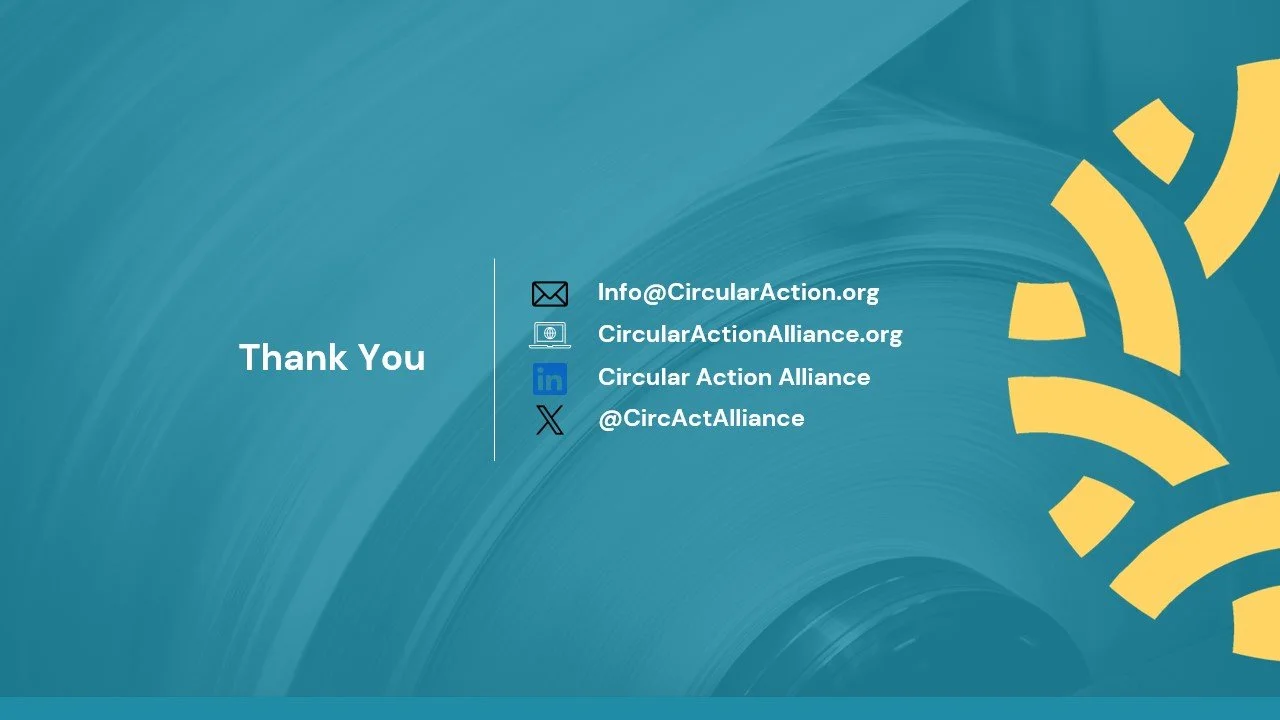Producer Working Group Meeting #2
The Producer Working Group (PWG) is a monthly opportunity for producers, their legal representatives, and trade associations to learn about and discuss priority producer issues. Please do not share this content beyond the group.
December 5, 2023
Presentation
Key Takeaways
Registration Timelines
Colorado has included a July 1, 2024, registration deadline for producers in their draft rules. We expect other states to clarify registration deadlines and are preparing to register producers in multiple states in 2024 to ensure adequate time to prepare for data collection, reporting, and other requirements (e.g. preparation of plastic source reduction plans in California)CAA will provide clarity about what registration entails for producers at a future Producer Working Group meeting.
Primary Producer Obligations
CAA has identified six areas of producer responsibility to guide early producer planning:Join the approved Producer Responsibility Organization (PRO)
Collect and report data to a PRO
Pay fees/dues based on reported data
Potential redesign of materials/delivery models (based on incentives)
Development of Plastic Source Reduction Plan**
Ensure materials are recyclable or compostable**
**California only.
Note: The first two items were covered in more detail during this PWG. The other obligations will be covered in future meetings.
Obligation #2 - Data Collection & Reporting
Finalized data reporting requirements are still months away, but companies need to start planning. Key factors to consider include:Which materials used by your company are in-scope in each EPR state?
Is your company likely to be considered the producer for these materials? Which ones?
How is each state categorizing material, as outlined through Covered Material Categories (CMC) lists? (i.e., California’s CMC List)
What eco-design considerations should producers account for? Some eco-design factors are outlined in statute, and CAA will continue to clarify requirements and incentives for producers.
Many of these factors are still in development through rulemaking processes. CAA will continue to provide guidance to producers through 2024. By joining CAA’s producer working group meetings, producers can ensure they are up to date on critical deadlines and reporting considerations.
Top Producer Questions
-
Each state has a slightly different PRO selection deadline.
Two states - Colorado and California - have appointed CAA to be the single PRO to implement their EPR laws. Maryland has selected CAA to be the single PRO to represent producer interests and serve on the State Producer Responsibility Advisory Council.
Oregon does not have an application deadline. Instead, PROs must submit a program plan to the state agency by March 31, 2024. Program plan approval is synonymous with PRO approval, provided the PRO represents a 10% minimum market share of covered products sold in or into the state. CAA is currently developing a program plan for submission by the deadline.
Maine does not have an application deadline. However, the state agency estimates they will publish a Request for Proposals from prospective PROs in the fall of 2025. CAA intends to submit a bid to act as PRO in Maine. -
Eco-modulation is an additional bonus or penalty applied to producer fees, intended to incentivize design choices like more recyclable materials, incorporation of recycled content, and other environmental considerations. CAA will help producers understand eco-modulation across states and continue to seek clarification throughout state rulemaking processes.
-
Not at this point. Fee setting is a complex process with many variables that differ across jurisdictions and materials. Until state rulemaking decisions are finalized and the number of producers and types of materials they supply into each state are known, no PRO can estimate how much an individual producer will owe.
CAA’s January 16 Producer Working Group will focus on helping producers understand the fee setting process. -
Covered material categories (CMC) lists are intended to categorize all in-scope materials in a state’s EPR program. If your material is not listed on a CMC list it may be exempted. However, the state’s statutory definition of covered material will ultimately determine what materials are in and out of scope.





































